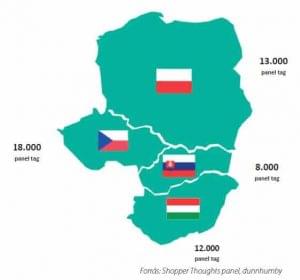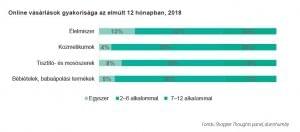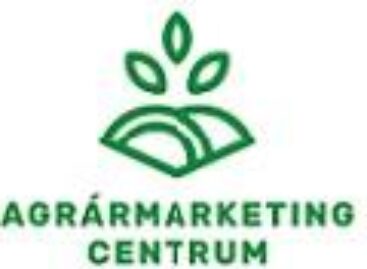We buy online more frequently
 According to the latest data from dunnhumby’s Shopper Thoughts panel, in the last 12 months Hungarians liked to buy the following categories online: consumer electronics (53 percent), the full FMCG category (44 percent), clothes and shoes (37 percent). Those shoppers who made an online purchase in the last 12 months, spent nearly half of their monthly full FMCG budget online.
According to the latest data from dunnhumby’s Shopper Thoughts panel, in the last 12 months Hungarians liked to buy the following categories online: consumer electronics (53 percent), the full FMCG category (44 percent), clothes and shoes (37 percent). Those shoppers who made an online purchase in the last 12 months, spent nearly half of their monthly full FMCG budget online.
However, when it came to buying food, shoppers still spent 73 percent of their monthly budget in physical stores. People prefer online supermarkets if they want to buy food or household products, while they like specialist webshops when they need cosmetics or pet food. One third of respondents said they buy online minimum 7 times a year.

Price discounts or new products/services represent great motivation for buying online in the FMCG category. In comparison with last year, in the food category the proportion of those who bought online for the first time to try a new type of service was up 10 percentage points.

It is really good news that nowadays only a small proportion of shoppers, 3 percent are worried about payment safety when buying online; and only 4 percent said the buying process was too complicated. The survey has also found that the biggest advantages of online shopping are saving time and other convenience factors, plus price comparison and gathering product information in advance. (x)
Related news
AMC: Hungarian organic products can be presented in Germany
🎧 Hallgasd a cikket: Lejátszás Szünet Folytatás Leállítás Nyelv: Auto…
Read more >Discover the solutions of the future on Startup Island! (Part 1)
🎧 Hallgasd a cikket: Lejátszás Szünet Folytatás Leállítás Nyelv: Auto…
Read more >Related news
The Store of the Future opens again at the SIRHA Budapest exhibition! (Part 3)
🎧 Hallgasd a cikket: Lejátszás Szünet Folytatás Leállítás Nyelv: Auto…
Read more >New country director at the helm of JYSK Hungary
🎧 Hallgasd a cikket: Lejátszás Szünet Folytatás Leállítás Nyelv: Auto…
Read more >







